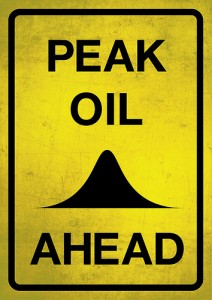Unlike advertising, well-executed PR doesn’t hit you over the head. Rather, it becomes an organic part of the public conversation, shaping and directing it, often by defining key terms and setting acceptable boundaries of thought and belief. So, as a professional in the field, it is with no small amount of interest that I have watched a recent rash of stories popping up in some fairly weighty mainstream outlets – Bloomberg BusinessWeek, for example and Forbes.com – declaring that new developments in unconventional oil sources, primarily shale, have finally – or, perhaps, once again – disproved the Peak Oil “theory” that purportedly states we’re running out of oil.
 This rash of Peak Oil denial articles has the earmarks of a classic PR push. How so? Well, sifting through the stories, I see a characteristic attempt to shape the conversation by redefining key terms and setting boundaries of discussion. A couple examples:
This rash of Peak Oil denial articles has the earmarks of a classic PR push. How so? Well, sifting through the stories, I see a characteristic attempt to shape the conversation by redefining key terms and setting boundaries of discussion. A couple examples:
- Peak Oil = running out: This shows up in a number of the articles and, for those who follow the issue, it’s an obvious misstatement. Peak Oil is primarily about rates of production, secondarily about the cost of those production rates and then about the net energy yield from that production. But that’s complicated. More casual readers won’t stay with a complicated discussion. An effective PR approach is to simplify the complication in a way that bolsters your position. In this case, inaccurately portraying Peak Oil as a claim that the world is “running out” of oil makes it credible to point to expensive, low flow rate sources like tar sands and shale oil as proof that we’re not.
- It’s a Theory: A favorite from the playbook, you may recognize it from efforts to discredit the teaching of evolution. The American public, generally speaking, has a poor understanding of how science defines and uses terms. What most people call a theory, science might call a hypothesis – more akin to speculation or, at best, an educated guess. In the natural sciences, the term “theory” is applied to concepts whose explanatory powers comport accurately and consistently with empirical observations. But, again, that’s complicated. Going with the common misconception and consistently associating Peak Oil with the term theory subtly, but powerfully, discredits it in the mind of the casual reader.
So, why the rash of articles now? From a PR standpoint, it may have had something to do with a recent article in the prestigious journal, Nature, in which two respected scientists declared that Peak Oil was not only real, but already here. In PR we call this an appeal to authority. Casual readers likely don’t have access to Nature’s pay wall to read the article or follow the work of either scientist who authored the piece. But, the casual reader will place more credibility in the Peak Oil “theory” if it’s reported that an august publication has published an article by two respected scientists in support of it. If you’re in the fossil fuel extraction business, that’s a five-alarm PR emergency.